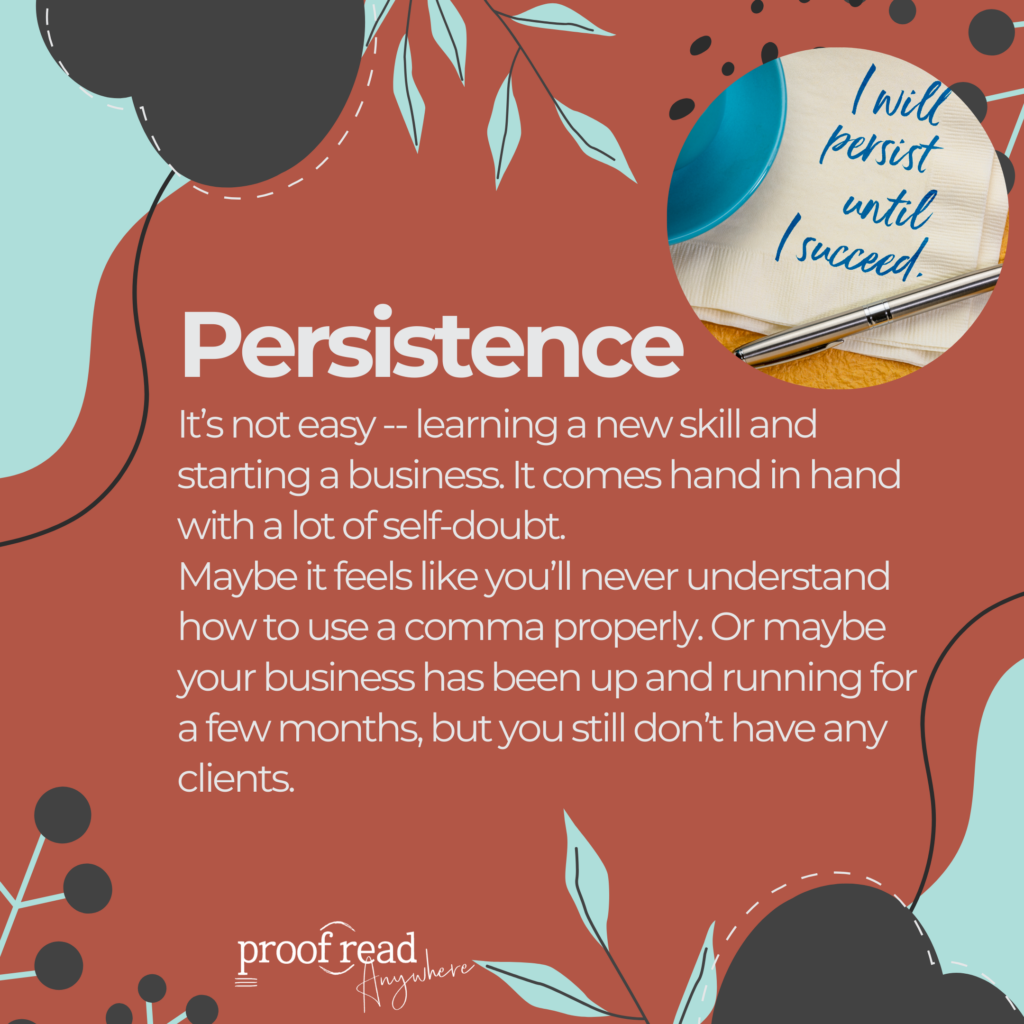6 Proofreader Qualities You Need to be Successful
One common question we get asked all the time is “How do I know if proofreading is for me?”
To be honest, we can’t answer that question for you. We can’t know what kind of proofreading services you can offer, how good you will be at spotting typos in a piece of writing, or if you have a strong command of the English language. Being a successful proofreader is all about your passions, skills, and determination.
So how do you decide if you have what it takes to be a proofreader?
You might be a proofreader if you are your family’s go-to resource for grammar and spelling questions. There are usually some telltale signs that you might want to become a proofreader. Excellent proofreaders often possess many of the same qualities. Chances are if you have almost all of these qualities, you’ll thrive as a proofreader.
Keep reading to find out what qualities successful proofreaders have in common.
1. Great attention to detail

Proofreading is something that some people are innately good at, so it’s a natural choice when word nerds are searching for ways to make money working from home. If you enjoy spotting errors or fancy yourself an “eagle-eyed pro”, you may get hooked on finding errors and polishing client projects.
Eagle eyes. You’ve probably heard us talking about eagle eyes before. Excellent proofreaders must be able to spot errors a mile off. Grammatical errors need to jump off the page at you.
Have you ever been tempted to call business owners to let them know what punctuation faux pas they’re committing? Ever wonder why businesses didn’t hire someone to proofread their content before they put it out there for the world to see? Do spelling errors make your eyes twitch and your blood boil?
If mistakes on billboards, menus, social media memes, etc. drive you crazy, then you might have it in you to be a proofreader.
But if you’re the kind of person who skims while they read or doesn’t really care about the nitty-gritty details, then proofreading most likely won’t be a good fit for you. Don’t worry, there are plenty of other work-at-home job opportunities out there.
2. Excellent grasp of spelling, grammar, and punctuation

You won’t get far as a proofreader if you don’t have an above-average grasp of spelling, grammar, and punctuation.
Excellent proofreaders understand the difference between there, they’re, and their. They know when you should use “less” rather than “fewer.” And they don’t hang on to outdated or just plain wrong grammar myths.
If you need a brush up on your grammar skills, you can check out our Look Better in Writing ebook or our favorite grammar course, Grammar Lion.
3. Willingness to learn

You don’t have to know everything right off the bat. Grammar, spelling, and familiarity with style guides can be learned. But you have to care about learning it. You have to be willing to research what you don’t know — whether that’s a grammar rule you’re not sure of or upgrading your computer skills.
The key is knowing an error when you see one, or at the very least knowing it could be an error and having the sense to stop and check.
A good proofreader doesn’t assume that they know everything just because they have a strong grasp of English in high school. They understand that the English language changes over time, and they’re aware they may have picked up some bad habits or misinformation over time.
An excellent proofreader will be willing to invest in themselves to make sure that they’re providing the highest quality service they can provide to their clients. They understand the importance of taking a proofreading course to hone their skills, and they actively use style guides and reference books like the Chicago Manual of Style to check if their gut feelings are correct.
The biggest hindrance to learning is refusing to open up your brain to actually learn.
What’s the purpose of learning? Mastery. Before you can profit from a skill, you must master it. That’s when the confidence comes. What does it mean to master something? It means you can do the thing almost effortlessly.
So, we want to encourage you: No matter how much you know (and we know you *do* know a lot!!), be willing and able to receive new knowledge into your brain.
If you want to learn how you can brush up on your proofreading skills, check out our free Intro to Proofreading workshop!
4. Flexibility

Proofreading isn’t always a 9-to-5 job, especially if you’re in the court reporting niche. This type of work can come in waves. When your clients aren’t busy, neither are you. But when they’re busy, you better be ready to work.
Proofreaders make more depending on the season and how many clients they have and that’s ok. Being able to adjust based on a variable income is essential to being a freelance proofreader.
Most transcript proofreading work comes in in the evenings, and it will take you longer than an hour to complete. General proofreading tends to be less fast-paced, but your clients won’t want to wait weeks for their documents to be returned. They may have deadlines that they need to meet.
You’ll need to be willing to communicate with your clients to make sure the timeline works well for both of you.
5. Desire to be excellent

You’ve got to want to do an amazing job. You’ve got to want to wow your clients with the accuracy of your work, your level of professionalism, and your ability to handle tight deadlines.
Professional proofreaders can’t half-ass things. It’s not that kind of industry. Excellence is expected and mistakes aren’t forgiven as easily as they would be in any other industry.
Of course, proofreaders are still human (last time we checked!). We make mistakes. But when we do make a mistake, we need to handle it with grace and learn from the experience. You don’t have to be perfect, but you need to be willing to learn and try again.
6. Persistence

It’s not easy — learning a new skill and starting a business. It comes hand in hand with a lot of self-doubt. Maybe it feels like you’ll never understand how to use a comma properly. Or maybe your business has been up and running for a few months, but you still don’t have any clients.
We can’t let things like these stop us.
Getting outside your comfort zone is the key to getting unstuck.
The only ways to guarantee failure are:
1) Never even try
2) Give up
Getting outside your comfort zone is the key to getting unstuck.

I look up a lot on the internet, about how to make money online and I came across transcription and proofreading, and many other things that have to do with writing. And I should say I am quite interested in anything that has to do with writing, English, and just basically fiddling with the keyboard. But as much as I thought, just because I can read and write basic English, that would be enough for me to get started, I was very wrong apparently, I needed way more than that. I went on to study punctuation and its usage, and that was still not enough. I really felt discouraged but after reading your article about how self-doubt is part of the ordeal and how I will definitely feel that once or twice the trick is to not give up, it has helped me feel better to learn more and be well on my way. I love how you say: “By giving up, you are refusing yourself some type of life.” I would love to spend more time with my daughter and invest in my businesses which have shut down because of covid19. Thank you for this article it really helped me a lot.
Thank you for this article it really helped me a lot. I'm very grateful for that.
Is work such as freelance proofreading limited to being able to spot misspelled words or does it include re-phrasing suggestions for better reading flow.
I ask because in your section '4. Flexibility', you double use the word 'in'. while i understand what you are saying and there are no grammar errors, I couldn't stop hearing it in my head. iwouldhave preferred the wording 'work comes in during the evenings…'
What you are referring to is more along the lines of editing. By the time you get the project as a proofreader, it should have had all the content rewritten and ready to go. You are the one who double-checks to make sure no embarrassing grammatical and spelling errors slip through. 🙂
Thank you for the article. In section 3 titled "Willingness to learn," paragraph 3 line 1 contains "they has" which should be "they have." I checked the comments before replying to see if this error had been spotted, and saw that someone already mentioned "in in" which is found in section 4.
Are these intentional errors to see if anyone catches them? Clever if so.
Thank you for the alert! All fixed! Just goes to show that even proofreaders need proofreaders!
I loved the use of real-life examples in this piece. It made the information more relatable.
Did Caitlin just jump into proofreading in the beginning, or did she take someone's course to get started?
Your ability to find common ground creates bridges between differing perspectives.
Thank you, Solar! We do our utmost to listen and value everyone’s opinions! 😉
Your words of encouragement have a profound impact on others' confidence.